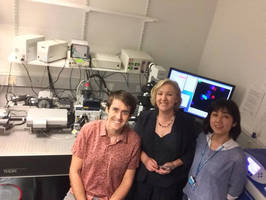Andor Revolution Microscope Captures Key Sequence in Killer Cells

High-resolution 4D imaging reveals the killing machinery organising itself within cytotoxic T lymphocytes as they prepare for attack
Belfast, UK: Although much is known of the immune response to antigen-presenting cells, until now the way the body's own killer cells establish an immunological synapse to destroy those target cells has remained unclear. Now, an international research team led by Professor Gillian Griffiths of Cambridge University has resolved the key sequence of events using high-resolution 4D imaging.
The resulting movies, captured on an Andor Revolution confocal spinning disk microscope equipped with iXon EMCCD cameras, are the first to demonstrate the killing machinery organising itself within the cytotoxic T lymphocytes (CTLs) as they prepare for attack. As well as revealing a critical role for actin reorganization in this complex process, the researchers believe it could lead to more effective cancer treatments.
"This is the first time that this process has been captured in 3D", says Professor Gillian Griffiths, explaining that killer cells had only previously been imaged in flat 2D images, which made it impossible to clearly discern events inside these cells. "The Andor Revolution confocal microscope enabled us to use new high-resolution 4D imaging techniques to capture images across the entire cell, visualising the changes inside these cells that enable them to kill, with a spatial and temporal resolution not seen before."
"We use the Andor Revolution and Andor's Imaris software for all of the imaging from my lab", continues Gillian. "I compared offerings from many other companies and found that Andor was the fastest to capture the stack across the cell and had the least photobleaching. The Andor cameras were key, as was the expertise of the Andor staff in listening to what we were trying to achieve and putting together a system that allowed us the speed and resolution that we needed.
"For fixed samples, the system is preferred over the standard confocals in the core facility as it is much faster to take the stacks. We have also recently upgraded to a dual-camera system, which has yielded an approximately 5-fold speed improvement."
According to Geraint Wilde of Andor, an Oxford Instruments company, the critical role for actin reorganization in initiating centrosome polarization and granule secretion is a critical finding. "The insights provided by this level of three dimensional dynamic imaging will allow us to understand the molecular mechanisms that control killer cells, and hold out the hope for improved cancer treatments. In elucidating the changes inside these cells that lead to killing, researchers will be able to find out why killer cells cannot control some cancers. In time you would then hope to be able to identify ways in which killer cells can be made more effective."
Andor's microscopy systems and scientific cameras address a broad range of optical microscopy techniques including laser spinning disk confocal microscopy, photo-bleaching, activation, conversion and ablation, TIRF, white light spinning disk confocal, calcium ratio imaging, comet assay and bioluminescence.
For more information, please visit the Andor website at www.andor.com/microscopy.
Reference
Alex T. Ritter, Yukako Asano, Jane C. Stinchcombe, N.M.G. Dieckmann, Bi-Chang Chen, C. Gawden-Bone, Schuyler van Engelenburg, Wesley Legant, Liang Gao, Michael W. Davidson, Eric Betzig, Jennifer Lippincott-Schwartz, and Gillian M. Griffiths. "Actin Depletion Initiates Events Leading to Granule Secretion at the Immunological Synapse," Immunity 42, 864-876 (2015).
About Andor
Andor is a global leader in the pioneering and manufacturing of high performance scientific imaging cameras, spectroscopy solutions and microscopy systems for research and OEM markets. Andor has been innovating the photonics industry for over 20 years and continues to set the standard for high performance light measuring solutions, enabling its customers to break new ground by performing light measurements previously considered impossible. Andor's digital cameras, are allowing scientists around the world to measure light down to a single photon and capture events occurring within 1 billionth of a second.
Andor now has over 400 staff across 16 offices worldwide, distributing products to over 10,000 customers in 55 countries. Andor's products are used in a wide range of applications including medical research to further the understanding of heart disease, cancer and neuronal diseases such as Alzheimer's and Parkinson's disease. Andor also has applications for forensic science and astronomy. Through continuous dialogue with customers and strong teamwork, Andor continues to innovate ground-breaking products that improve the world in which we live.
More information is available at www.andor.com.
About Oxford Instruments plc
Oxford Instruments designs, supplies and supports high-technology tools and systems with a focus on research and industrial applications. Innovation has been the driving force behind Oxford Instruments' growth and success for over 50 years, and its strategy is to effect the successful commercialisation of these ideas by bringing them to market in a timely and customer-focused fashion.
The first technology business to be spun out from Oxford University, Oxford Instruments is now a global company with over 2000 staff worldwide. Its objective is to be the leading provider of new generation tools and systems for the research and industrial sectors with a focus on nanotechnology. Its key market sectors include nano-fabrication and nano-materials. The company's strategy is to expand the business into the life sciences arena, where nanotechnology and biotechnology intersect.
This involves the combination of core technologies in areas such as low temperature, high magnetic field and ultra high vacuum environments; Nuclear Magnetic Resonance; x-ray, electron, laser and optical based metrology; atomic force microscopy; optical imaging; advanced growth, deposition and etching.
Oxford Instruments aims to pursue responsible development and deeper understanding of our world through science and technology. Its products, expertise, and ideas address global issues such as energy, environment, security and health.
For further information, please contact Andor Technology direct or their marketing agency, Catalyst Communications.
Andor Technology plc.
Corporate Headquarters
7 Millennium Way
Springvale Business Park
Belfast BT12 7AL
+44 (0) 28 9027 0812
Andor website
press@andor.com
Catalyst Communications
The Annexe
 2 Crispin Way
Farnham Common
Buckinghamshire SL2 3UE
+44 (0) 1753 648 140
Catalyst website
john.waite@catalystpr.com
Andor contact
Jonathan Rice
+44 (0) 28 9023 7126
Media contact
John Waite
+44 (0) 1753 648 140




